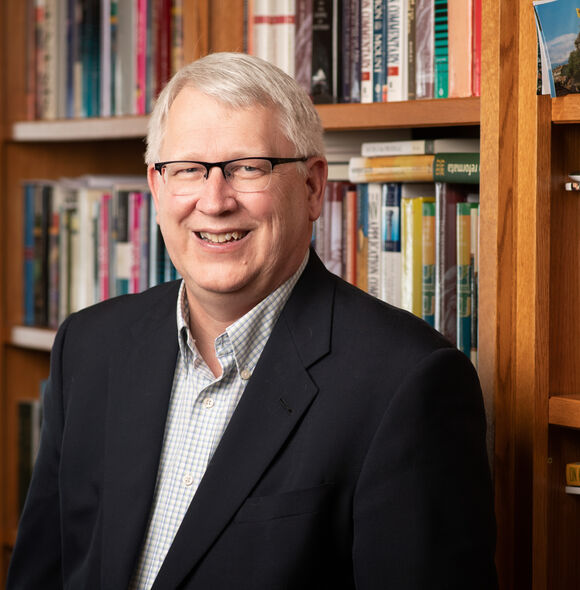Words Matter: Getting Specific

Published by Jul Medenblik
President
We live in a world of slogans and soundbites. If you doubt this, just watch political commercials for the next few weeks!
I believe one of the reasons why we love such short summary statements is because we live in a complex world. Living in such a world can be tiring and bewildering and short statements help us relieve that pressure and navigate life in the moment.
One of my favorite lawyer jokes starts this way: A farmer comes into town and tells people he is looking for a “one-armed” lawyer. People are puzzled and ask – “Why do you want a one-armed lawyer?” The farmer snorts – “I am sick and tired of going to a lawyer and hearing them say – “Well on the one hand …. But then on the other hand. A one-armed lawyer is simpler for me to follow and believe in.”
In many conversations that I have been a part of or observed related to the Church, I have heard short phrases or statements that are “slogans” and “soundbites.”
In recent conversations on various topics, including human sexuality within the Christian Reformed Church, we have, at times, used words and phrases to defend our position and score points against the position of another.
I would suggest that these sound bites can stand in the way of our appreciating and seeking to understand one another and they will therefore hinder our search for wisdom – together.
Here are four recent examples that I would identify for us to consider:
“This (human sexuality conversation) is a wedge issue.”
Is it? A wedge issue is a divisive political issue, especially one that is raised by a candidate for public office in hopes of attracting or alienating an opponent’s supporters. To call the human sexuality conversation a wedge issue is to imply it is all about politics and power rather than discernment of Biblical standards.
Most churches have judged it to be much more than a wedge issue. The topic of human sexuality has been a key issue for multiple church denominations and it is also a global concern.
“Theobros” and “Coup Boyz”
are labels that resulted in an “othering” of fellow brothers and sisters in Christ. These labels also fail to do the historical analysis of working through the three streams of thinking and living that have marked CRCNA history: the pietists, doctrinalists and transformationalists. I would suggest that what we are witnessing is another chapter in the unfolding story of how those three streams function and even contest against each other to answer the question – “How shall we now live in this world?”
Is it messy? Yes, but to reduce the messiness and other people to labels is twisting rather than clarifying.
“There is rot in the denomination.”
A video summary of Synod 2022 in which this statement was included has been taken down, but the words still linger. I am not naïve. I know some people do believe that “rot” needs to be removed as they compare the denomination to a tree that needs to be pruned. At the same time, the statement seemed to also be a blanket judgment on people that work within the denomination. I am glad the video was taken down, but I am concerned that such language is a failure to live by the light of the confessional standard of Question and Answer #112 from the Heidelberg Catechism.
Q. What is the aim of the ninth commandment?
A. That I never give false testimony against anyone,
twist no one’s words, not gossip or slander,
nor join in condemning anyone rashly or without a hearing.
Rather, in court and everywhere else,
I should avoid lying and deceit of every kind; these are the very devices the devil uses,
and they would call down on me God’s intense wrath.
I should love the truth, speak it candidly,
and openly acknowledge it. And I should do what I can
to guard and advance my neighbor’s good name.
Guarding and advancing the good name of another takes work and we need to do such work to be God’s people of grace and truth.
“This is a salvation issue.”
I appreciate the recent decision of Synod 2024 to not make such a declaration because salvation is a topic that reminds me of Paul’s words about the love of God when he wrote: And I pray that you, being rooted and established in love, 18 may have power, together with all the Lord’s holy people, to grasp how wide and long and high and deep is the love of Christ, 19 and to know this love that surpasses knowledge—that you may be filled to the measure of all the fullness of God. Ephesians 3:17b-19
The love of God cannot be contained within any theological box or construct. Such love comes to us with a level of messiness and grandeur that should cause us all to bow our knees in worship before the Triune God.
In some ways, this love is beyond our attempts for clarity or a simple slogan. The love of God is a mystery that should always cause us to marvel and wonder at the kindness of God to us unworthy beings.
Share
Visit Calvin Theological Seminary’s Campus
We can’t wait to host you on campus! Schedule your visit today, or, if you need more time to find a date that works for you, please request information so we can continue the conversation about supporting your calling!
